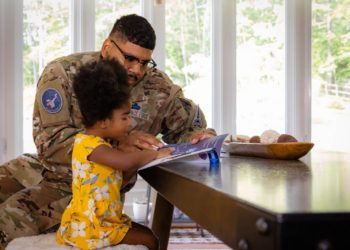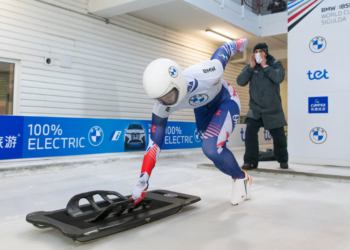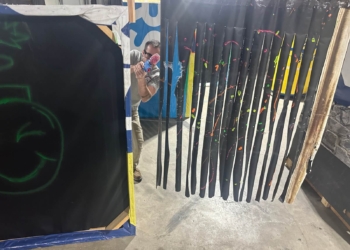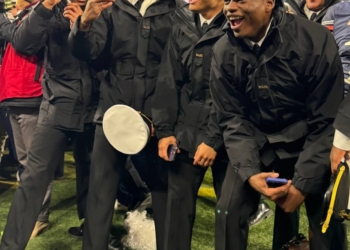In the 20 years of Kathrine Switzer’s life before her participation as the first woman to enter the Boston Marathon, she said she had “never been manhandled, never even spanked as a child.”
Less than a handful of miles through the 1967 Boston Marathon, she was attacked by race manager Jock Semple who shouted at her, “Get the hell out of my race and give me those numbers!”
Switzer finished the race on April 19, 1967, refusing to fall victim to the attack that would change the trajectory of her entire life.
“It was the courage I gained from heavy training and my father’s example of never quitting that made me decide instantly that I was not quitting the Boston Marathon, even though there was terrible pressure to do so,” she told Military Families Magazine.

The daughter of a WWII and Korean War veteran, Switzer said her father, Homer, is the reason she propelled herself into a physical sport rather than joining the cheerleading squad growing up.
“‘Cheerleaders cheer for other people; you want people to cheer for you. Life is to participate, not spectate,’” Switzer said her father told her. As a result, she joined the new girls’ hockey team.
She recalled a time after one of her marathon victories, a crowd of reporters around her and there being one reporter who, unable to get a microphone to reach the storied athlete, turned to Homer – about 65 at the time – to interview him. The reporter said, “Tell me, sir, did you run also?”
“Without missing a beat, my father said, ‘No, I always stood and fought.’”
Switzer’s father, Homer, achieved the rank of lieutenant colonel by the time she was 6 years old. He attended the University of Illinois and studied agriculture, but “worked like a dog on the family farm, doing heavy jobs nobody else could or would do,” Switzer said.
Homer joked that he enlisted in the National Guard because he needed the extra $1 a month, Switzer said. He served in the horse cavalry and as an instructor. During WWII, he trained troops and following the war, he was sent to Germany in 1946 to help organize some of the American Displaced Persons camps – “a very tough and heartbreaking job,” Switzer said.
Homer and his wife, Virginia, had their daughter in 1947. In 1950, he was assigned to the Pentagon before he volunteered for action and served in the Korean War. He was discharged from service in 1962.
“His work ethic was phenomenal. He was an incredible example, and often made difficult things a fun challenge for me,” she said. “’I bet you can jump over that creek,’ ‘climb that tree,’ etc.”

To prepare for her hockey career, Switzer’s father encouraged her to run a mile every day leading up to tryouts.
“I said, ‘I could not possibly run a mile,’ and he said, ‘Sure you can. Let’s go do it now,’” Switzer said.
She was so excited every time she ran that mile, she said, but to her father, each mile was another stepping stone.
“He looked at me seriously and said quietly, ‘Now you do that every day.’ And I did. And the rest is history,” Switzer said. “Running one mile a day morphed into several and the running always made this little bespectacled girl feel strong and empowered. It was a secret weapon nobody could take away from me. I will always, always be grateful to my dad.”
In addition to the spirit her father instilled in her, being a military brat taught her how to be adaptable and make new friends and “make things like moving an adventure.” Lastly, she credits her parent’s relationship in her fights for women’s equality.
Her mother “always was her own person with her own career,” Switzer said. “It was good to see that there was more equality in their marriage than most.”

Switzer’s organization, 261 Fearless, Inc., inspires and challenges women the way her father inspired her while also giving them a sense of community in a world that isn’t always so welcoming to the fight for women’s rights.
That fateful day, a fight or flight response to a public attack nearly derailed Switzer’s entire mission.
“I felt unable to flee, like I was rooted there, and indeed I was, because the man, this Jock guy, had me by the shirt,” Switzer detailed in her memoir, “Marathon Woman.”
She was stunned by “the physical power and swiftness of the attack.”
She felt like she could puke and was deeply humiliated, and for a moment she considered quitting — but only for a moment.
“When I finished the race, I knew other women were not there because they were afraid of doing something difficult, because nobody had given them the opportunity to try,” she told Military Families Magazine. “See, my parents always gave me the opportunity.”

Switzer and her friends started the nonprofit organization using her bib number from the race: 261, “as a number meaning fearless in the face of adversity,” she said. Through the organization, Switzer and her chapter ambassadors empower women with running/fitness and education in a safe, non-judgmental space and give them friendship and camaraderie.
“I have found that giving back is one of the most powerful things we can do with our lives, and my father helped teach me that,” she said.
Today, the organization is 10 years old with approximately 1,000 women in 54 running groups across chapters in 15 countries.
Switzer created a global program for Avon Cosmetics, eventually growing to 400 races in 27 countries for more than a million women. She said this gave her the data to present to the International Olympic Committee, and they voted in 1981 to include the women’s marathon for the 1984 Olympic Games.
“It’s not about conquering the world,” said Edith Zuschmann, CEO, president and co-founder of 261 Fearless, Inc. “If we conquer the world of one woman, the job is done because this creates a ripple effect. She becomes an inspiration for others.”
Zuschmann began the first chapter in Vienna, Austria, after being inspired by Switzer, who she met when she served as her driver during a visit to the country to receive an award. There, the groups target women with immigration backgrounds, specifically from Afghanistan.
Zuschmann said one woman in particular found herself single with three children after her spouse was unfaithful. Through the group, she began to work on learning a new language and eventually was asked to take on a leadership role.
“Just seeing the journey and how she has developed leadership skills, and how she has grown in her self-esteem, self-efficacy, everything, this is just astonishing,” Zuschmann said. “And it was just this little trigger: ‘Hey, come with me.’”





























